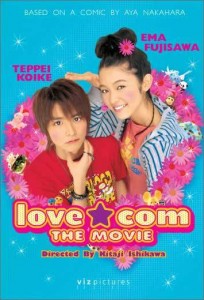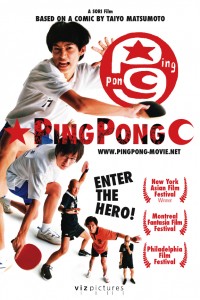As anyone who’s seen Green Lantern or Captain America can attest, adapting a comic for the silver screen is an art, not a science. Done poorly, comic book movies alienate fans with the omission of favorite characters and glossing of seminal plotlines, or confuse newcomers with in-jokes and choppy storytelling. Done well, however, comic book movies can appeal to just about anyone who’s receptive to the genre and the characters. VIZ Pictures may not have released as many comic-book movies as DC or Marvel, but its catalog includes adaptations of several popular manga, including Aya Nakahara’s Love*Com, Ai Yazawa’s NANA, and Taiyo Matsumoto’s Ping Pong. These three films make an instructive case study, as they illustrate the pitfalls and potentials of bridging the gap between page and screen.
 Love*Com: The Movie
Love*Com: The Movie
VIZ Pictures • 100 minutes • No Rating
Risa, the tallest girl in the seventh grade, develops a crush on Otani, the shortest boy in her class. Though superficial opposites, the two are really kindred spirits, sharing an enthusiasm for Umibozu (a Japanese rap artist that their classmates detest), swapping good-natured insults, and bonding over memories of rejection for being too tall and too short, respectively.
Whether you’ve read Aya Nakahara’s charming manga or not, you won’t have too much difficulty guessing how the story will end. The problem, however, is that Risa and Otani’s journey from bickering classmates to boyfriend and girlfriend seems utterly contrived. The scriptwriter borrows two romantic rivals from different volumes in the series’ run, but only succeeds in making Mr. “Mighty” Maitake, Risa’s handsome homeroom teacher, an integral part of the story. Even then, Mighty’s arrival is a bolt from the blue, and is never satisfactorily explained; he’s simply inserted into the final act of the story so that he and Otani can compete for Risa’s affections. (And when I say “compete,” I mean it: the two play a pick-up basketball game in front of the entire school.)
The other major drawback to Love*Com is its superficial treatment of the principal characters. Though Aya Nakahara’s manga charts the ups and downs of Risa and Otani’s friendship in minute detail, the movie’s frantic pace never allows us to get to know the characters or understand why they’re drawn to each other; we simply see them walk through a variety of stock scenes — cultural festivals, school trips — without actually seeing the evolution of their feelings dramatized.
It’s a pity that the Love*Com script feels so hastily assembled, as the film has the potential to appeal to both long-time fans and newcomers. The button-cute leads have some chemistry, even if the script doesn’t give them much to do. And the script shows flashes of inspiration; a “director” surrogate periodically interrupts the proceedings to explain certain peculiar-to-manga conventions (most notably the nosebleed-as-sign-of-arousal), intoning this information over strains of Beethoven’s Moonlight Sonata. These digressions occur just a few times, but add some much-needed humor to a film that lacks the wit and honesty of the source material.
The verdict: Skip it. This flat, uninspired retelling of Risa and Otani’s courtship will bore all but the most devoted Love*Com fans.
This review originally appeared at PopCultureShock on 3/24/08.
 Nana
Nana
VIZ Pictures • 114 minutes • No Rating
I admire Kentaro Otani’s chutzpah in bringing NANA to the big screen, as it’s the kind of story that inspires intense devotion to the characters; make a poor casting decision or cut a beloved character and you run the risk of angering the manga’s most devoted fans. Otani steers clear of those hazards, however, assembling an appealing cast that look and sound like their cartoon doppelgangers. The movie offers a somewhat streamlined account of the manga’s first five volumes, beginning with the two Nanas’ fateful encounter on a Tokyo-bound train and ending with Trapnest’s first visit to the girls’ apartment. Most of the dramatic juice is supplied by Hachi’s relationship with the feckless art student Shoji, and by Nana O.’s relationship with Trapnest bassist Ren.
As much as I enjoy the manga, I’ve always found Hachi’s relentless enthusiasm and boy-crazy antics irritating and couldn’t imagine why the fierce, scornful Nana O. didn’t feel the same way about her. As portrayed by Aoi Miyazaki, however, the character makes more sense. Miyazaki does a superb job of convincing us that Nana O. would befriend someone who seems too ditzy, too dependent, and too femme to hang with an up-and-coming punk act. Mika Nakashima, as Nana O., also turns in a solid performance, playing her character as a believable mixture of belligerence, determination, and vulnerability.
The other great advantage of the movie is its soundtrack. All of the rock-n-roll shoptalk and song lyrics seemed a little preposterous on the page; I had a hard time imaging why Trapnest or Black Stones commanded loyal followings, as they seemed like pallid imitations of Siouxsie and the Banshees. Seeing and hearing these acts in the film, however, transported me back to my college years, reminding me how passionately I felt about certain musicians, and how much their songs felt like an expression of my own identity. The film’s two lengthy concert scenes are highpoints of the film, offering us a window into both girls’ complicated emotional lives — their dreams, their disappointments, their improbably close relationship.
I had a few small bones to pick with the scriptwriters — what happened to Junko and Kyosuke? — but on the whole, I found NANA immensely entertaining. The true measure of the film’s appeal, however, is that my sister, who isn’t a manga maven, loved it too, and wanted to know if there was a sequel. Thank goodness the answer is yes.
The verdict: Rent it. Some die-hard fans may take issue with the casting and script, as the film isn’t as faithful to the manga as the anime adaptation is.
This review originally appeared at PopCultureShock on 3/24/08.
 Ping Pong
Ping Pong
VIZ Pictures • 114 minutes • No Rating
Based on Taiyo Matsumoto’s manga of the same name, Ping Pong focuses on a pair of friends: Peco (Yosuke Kubozuka), a flamboyant table tennis star who’s obsessed with the game, and Smile (Arata), a reticent young man whose primary motive for playing is to spend time with Peco, whom he quietly regards as a hero. Peco’s swaggering style — complete with acrobatic leaps, trash talk, and frequent dives — makes for good theater, but he’s trounced in a tournament by long-time rival Demon (Koji Ohkura). Despondent over the loss, Peco quits the team and burns his paddle. The coach, himself a former champion known as “Butterfly Joe” (Naoto Takenaka), then turns to Smile to lead his peers to victory in the next major competition, a responsibility Smile is reluctant to accept.
Like Hoosiers, Rocky, Rudy, or A League of Their Own, Ping Pong sticks close to the sports movie playbook, delivering epiphanies with clockwork precision. Smile discovers his inner competitor. Peco discovers that he can’t live without ping pong. “Butterfly Joe” imparts wisdom to Smile. And so on.
Yet for all its sports-movie posturing, Ping Pong is weirdly thrilling, thanks, in large part, to the colorful cast of supporting characters: there’s Peco’s chain-smoking grandmother (Mari Natsuki), a fierce devotee of the sport who runs a table tennis dojo; China (Sam Lee), a washed-up Chinese champion seeking a fresh start in Japan; and Dragon (Shidou Nakamura), a competitor who shaves his eyebrows in an effort to look more intimidating. The other key to Ping Pong‘s success is its fidelity to Taiyo Matsumoto’s original vision. Director Fumihiko Sori’s painstaking efforts to recreate the look and feel of the manga are evident throughout the film, from the casting decisions to the extreme camera angles, jump shots, and fleeting fantasy sequences; Sori manages to capture Ping Pong‘s heightened reality without becoming too arch or mannered.
Fans wanting a behind-the-scenes look at the table tennis action or a few pointers for their own game will want to view the omake on this two-disc set, which includes a 54 minute “making of” documentary, a short “how to” feature reviewing ping pong techniques, and the usual assortment of trailers, tv spots, and cast profiles. All in all, Ping Pong makes a great addition to your library, especially if you still have dog-eared copies of No. 5 kicking around the attic.
The verdict: Rent or buy it. The film captures the arch, surreal quality of Taiyo Matsumoto’s writing even better than the animated version of Tekkonkinkreet.
This review originally appeared at PopCultureShock on 8/28/07.



